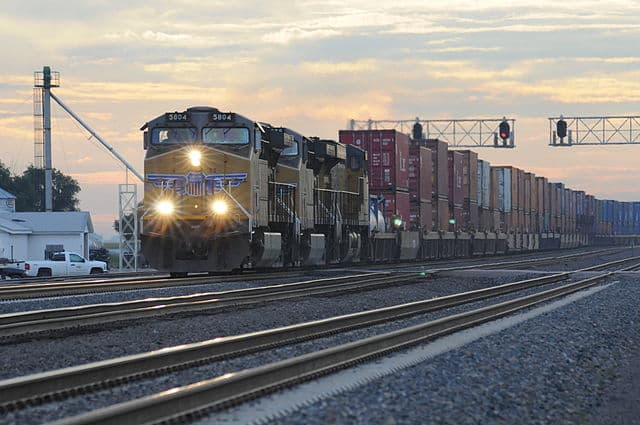Railroad Strike Averted After Tentative Labor Deal Reached
A stoppage could have begun as early as Friday that could halt shipments of food and fuel at a cost of $2 billion a day.

WASHINGTON — President Biden said Thursday a tentative railway labor agreement has been reached, averting a potentially devastating strike before the pivotal midterm elections.
He said the tentative deal “will keep our critical rail system working and avoid disruption of our economy.”
The announcement followed a push by members of his administration to keep talks going at Washington, D.C. between the railroads and unionized workers in hopes of averting a shutdown.
After a long night, the talks succeeded and Mr. Biden announced Thursday that the parties had reached a tentative agreement to avoid a shutdown that would go to union members for a vote. He hailed the deal in a statement for avoiding a shutdown and as a win for all sides.
“These rail workers will get better pay, improved working conditions, and peace of mind around their health care costs: all hard-earned,” Mr. Biden said. “The agreement is also a victory for railway companies who will be able to retain and recruit more workers for an industry that will continue to be part of the backbone of the American economy for decades to come.”
It looked far more tenuous for the president just a day earlier.
United Auto Workers Local 598 member Ryan Buchalski introduced Biden at the Detroit auto show on Wednesday as “the most union- and labor-friendly president in American history” and someone who was “kickin’ ass for the working class.” Mr. Buchalski harked back to the pivotal sitdown strikes by autoworkers in the 1930s.
In the speech that followed, Mr. Biden recognized that he wouldn’t be in the White House without the support of unions such as the UAW and the International Brotherhood of Electrical Workers, saying autoworkers “brung me to the dance.”
Yet back in Washington, officials in his administration at the Labor Department were in tense negotiations to prevent a strike — one of the most powerful sources of leverage that unions have to bring about change and improve working conditions.
Without the deal that was reached among the 12 unions, a stoppage could have begun as early as Friday that could halt shipments of food and fuel at a cost of $2 billion a day.
Far more was at stake than sick leave and salary bumps for 115,000 unionized railroad workers. The ramifications could have extended to control of Congress and to the shipping network that keeps factories rolling, stocks the shelves of stores and stitches America together as an economic power.
White House press secretary Karine Jean-Pierre, speaking aboard Air Force One as it jetted to Detroit on Wednesday, said a rail worker strike was “an unacceptable outcome for our economy and the American people.”
The rail lines and their workers’ representatives “need to stay at the table, bargain in good faith to resolve outstanding issues, and come to an agreement,” she said.
Mr. Biden faced the same kind of predicament faced by President Theodore Roosevelt in 1902 with coal and President Truman in 1952 with steel — how do you balance the needs of labor and business in doing what’s best for the nation?
Railways were so important during World War I that President Wilson temporarily nationalized the industry to keep goods flowing and prevent strikes.
Union activism has surged under Mr. Biden, as seen in a 56 percent increase in petitions for union representation with the National Labor Relations Board so far this fiscal year.
Sensing political opportunity as a strike appeared to loom, Senate Republicans moved Wednesday to pass a law to impose contract terms on the unions and railroad companies to avoid a shutdown. Democrats, who control both chambers in Congress, blocked it.
“If a strike occurs and paralyzes food, fertilizer and energy shipments nationwide, it will be because Democrats blocked this bill,” said Senator McConnell.
Back at the Labor Department, negotiators ordered Italian food as talks dragged into Wednesday night and the White House announced the agreement at 5:05 a.m. on Thursday.
